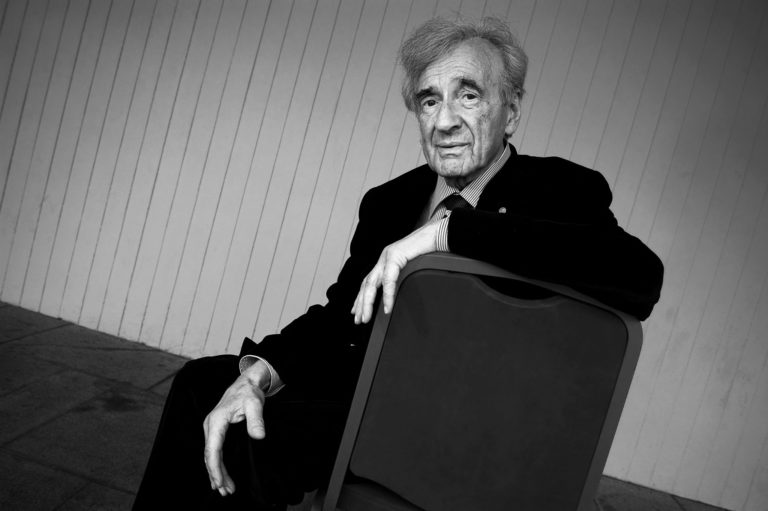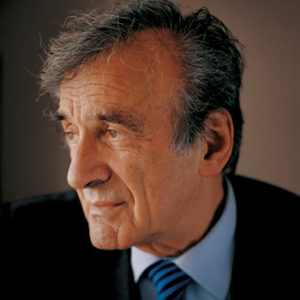Elie Wiesel
Evil, Forgiveness, and Prayer
“When words bring you closer to the prisoner in his cell, to the patient who is dying on his bed alone, to the starving child, then it’s a prayer.” Elie Wiesel, the beloved writer known for his memoir of the Holocaust, “Night,” speaks of the power of prayer and forgiveness in the wake of profound suffering.

Image by Stanislav Krupar/Redux, © All Rights Reserved.
Guest

Elie Wiesel was a writer, professor, political activist, and Holocaust survivor. He received the Congressional Medal of Honor and the Nobel Peace Prize, and was Andrew W. Mellon Professor in the Humanities at Boston University.
Transcript
KRISTA TIPPETT, HOST: The extraordinary and wise Elie Wiesel has died at the age of 87. He was often cited as an icon of a reasonable loss of faith. There is a terrible moment in his memoir of the Holocaust, Night, when he watches a young boy die slowly by hanging and repeats the question posed by someone in the crowd: “Where is God now?” Wiesel writes, “I heard a voice within me answer him. Where is He? He is hanging here on this gallows…”
In 2006, I sat across from him in a hotel room that my producers had turned into a makeshift studio and I asked him to tell me what happened after he lost his faith forever, as he wrote, at Auschwitz. He answered:
“What happened afterwards is in the book. I went on praying.”
Elie Wiesel ever after enriched my understanding of prayer and forgiveness and the problem of evil, which was nowhere more embodied in the 20th century than in Germany, where I first encountered him as a young journalist in divided Berlin.
MR. ELIE WIESEL: Germany, you were there, and I was there once visiting. I am asked occasionally, do you forgive? Who am I to forgive? I am not God. I don’t believe in collective guilt.
MS. TIPPETT:I met you there. We talked about it. It was January 20, 1985. Now, I have a recollection it was one of the first…
MR. WIESEL: First time in Berlin.
MS. TIPPETT:First time you’d been in Berlin. You met with a group of young Germans, and I have never forgotten what you said when you came out. I was there with another New York Times correspondent, and you said, “I had never before considered that it could be as painful to be the children of those who ran the camps as to be the child of those who died in them.”
MR. WIESEL: Because I have students from Germany and you cannot imagine the affection I have for them, the empathy I have for them. I want to help them. They need help. One of them said to me, even in Berlin then, said, you know, “I just discovered a few weeks ago that…” He discovered that his father was an S.S. officer. He said, “What should I do? What Hitler has done, he destroyed so many lives that had not been born yet. His people.”
MS. TIPPETT:How did you respond to that student?
MR. WIESEL: Well, you can imagine. I took him aside and we spoke, and we spoke, and we spoke. And I simply said, “Look, he’s your father. Talk first. First let him talk to you, and you talk to him. And then you decide what to do. I understand. Absolutely, I understand.”
I went back to Berlin for the last time in the year 2000, January 27. The Bundestag, which is the parliament, came to Berlin for the first time. They had a session, the parliament, in the Reichstag in Berlin, and they invited me to speak. And I came. The 27th of January. At the end of my speech, I turned to the president, who was there, and the entire government and diplomatic corps. I said, “Mr. President, why not ask the Jewish people for forgiveness? I’m not sure the Jewish people can accept, but why not ask?” A week later, he went to Israel, to Jerusalem. He went to the parliament and he asked for forgiveness.
MS. TIPPETT:That trip was a result of your speech.
MR. WIESEL: I think so. So I felt good.
MS. TIPPETT:Is “forgiveness” a big enough word or a good enough word for this?
MR. WIESEL: No, I cannot. No, I cannot forgive.
MS. TIPPETT:You said you can’t forgive. So if you can’t forgive, what can you do? What is the endeavor, the holy endeavor?
MR. WIESEL: This is the aim — first of all, to tell the truth, and to sensitize other people not to do the same thing. We aren’t here to forgive. We are, in the Jewish faith, on the eve of Yom Kippur, which is the holiest day of the year, and we plead with God for forgiveness, and God forgives, I hope. But one thing He does not forgive: the evil I have done to other fellow human beings. Only they can forgive. If I do something bad to you, I cannot ask God to forgive me. You must forgive me.
MS. TIPPETT:That’s much harder, much more exacting. I wondered if I could ask you to read the prayer that I found in your book One Generation After. You talked a lot in Night — and we talked about this already — about struggling with prayer, to be able to pray or not, or what it meant. And I think this was a prayer that you wrote in a diary.
MR. WIESEL: I agree, yeah.
MS. TIPPETT:And I wondered if you would read that to me, and talk to me about how you began to pray again, and how you pray differently now because of the life you’ve lived.
MR. WIESEL: “I no longer ask You for either happiness or paradise; all I ask of You is to listen and let me be aware and worthy of Your listening. I no longer ask You to resolve my questions, only to receive them and make them part of You. I no longer ask You for either rest or wisdom, I only ask You not to close me to gratitude, be it of the most trivial kind, or to surprise and friendship. Love? Love is not Yours to give.
As for my enemies, I do not ask You to punish them or even to enlighten them; I only ask You not to lend them Your mask and Your powers. If You must relinquish one or the other, give them Your powers, but not Your countenance.
They are modest, my prayers, and humble. I ask You what I might ask a stranger met by chance at twilight in a barren land. I ask You, God of Abraham, Isaac, and Jacob, to enable me to pronounce these words without betraying the child that transmitted them to me. God of Abraham, Isaac, and Jacob, enable me to forgive You and enable the child I once was to forgive me too. I no longer ask You for the life of that child, nor even for his faith. I only implore You to listen to him and act in such a way that You and I can listen to him together.”
MS. TIPPETT:I’m wanting to ask you if, in this journey from being a person who would say that your faith was gone forever, were there any dramatic moments or turning points where you couldn’t make that statement anymore?
MR. WIESEL: I couldn’t make it ten minutes later. At that moment, I made it. And because it was there, I had to make it. But as I said earlier, then I went back to prayer. What is prayer? You take words, everyday words, and all of a sudden they become holy. Why? Because there is something that separates one word from another and then you try to fill the vacuum. With what? With whom? With what memory? With what aspiration? So when words bring you closer to the prisoner in his cell, to the patient who is dying on his bed alone, to the starving child, then it’s a prayer.




